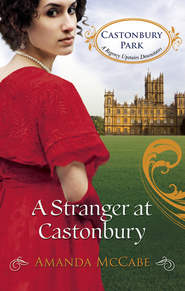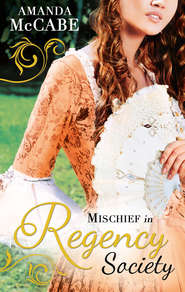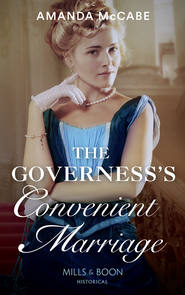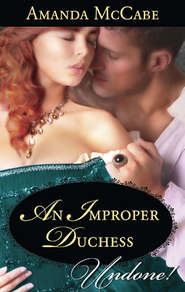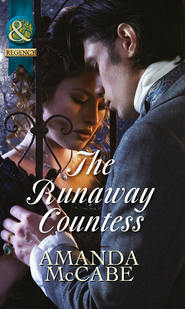По всем вопросам обращайтесь на: info@litportal.ru
(©) 2003-2024.
✖
Miss Fortescue's Protector In Paris
Автор
Год написания книги
2019
Настройки чтения
Размер шрифта
Высота строк
Поля
‘Yes, it seems they don’t plan to make it back to England any time very soon and I am so caught up in that business with the new spice company out of Madras. I was thinking you could go to Paris in my place. You did such a grand job last year.’
Go back to Paris? Where she’d last seen Chris? Last did such a foolish thing and kissed him in the maze at Lady Rippon’s garden party? Emily turned away as she felt her cheeks turn hot.
Her first instinct was to say no. Paris had such an intoxicating effect on her. But Gordston’s business was very important. And she had heard that Chris was still gadding about the Continent somewhere, doing who knew what. Perhaps he was in Austria with Will and Diana. She would surely not even see him in Paris again.
The butler announced dinner before she could answer and she took her father’s arm to make their way towards the dining room. She glimpsed her mother’s portrait, as she did every night, hanging near the doorway. Maude Fortescue smiled down at her husband and daughter serenely, always young, always perfect. How Emily wished she could ask her advice now!
But she could not. She never could. Growing up without a mother had made her keep her own counsel, find her advice in books and from her friends. That couldn’t change now. But Alex and Diana’s marriages, the way they did something different from most of the women in their world, made her wonder if there could be a way for her, too. Probably not. Will and Malcolm were unique husbands.
The dining room was a grand space, meant for entertaining and impressing business associates. With a long, polished mahogany table lined with blue-and-white-striped satin chairs, the silk-papered walls lined with valuable Old Masters, the sideboard gleaming with silver, it spoke quietly of her father’s success and good taste. But with only herself and her father at dinner, it seemed full of shadows, echoing, empty.
But two places were arranged at one end of the vast table, a cosy oasis of candlelight glowing on the Wedgwood porcelain, the heavy old silver. Their own cosy world, made just for themselves. What would she do one day when there was only one place laid at her table?
‘How lovely it is to get to spend the evening with my beautiful daughter,’ her father said as the footman ladled out the salmon bisque. ‘It is much too rare. You’ve become quite the social butterfly lately!’
Emily laughed. Parties were one way to outrun herself, to be sure. ‘You are the one who always taught me the value of connections, Father. I’m finding future customers wherever I go. You are no slouch in that direction, either. Were you not at the Criterion with Lady Musgrave’s party last week? I am sure I read about it in the paper.’
Albert’s cheeks flushed just a bit above his silvering whiskers and Emily wondered if there was more to the contact with Lady Musgrave than a visit to the theatre and a restaurant. She certainly was a handsome lady, widowed and energetic and cultured. Maybe that was the sort of rest her father needed? A new companion? Where would Emily’s place be, then? Yet she would love her father to find a friend.
‘You are quite right, my dear,’ he said. ‘Connections are all. And Lady Musgrave does serve the best wine in town, her cellar is beyond excellent. I should see about selling her a few cases.’
Emily laughed. ‘See? Always working. But, yes, it is very nice to have a dinner to ourselves.’
The footman brought in the fish course, a trout in lemon sauce. ‘Perhaps a hand of piquet after?’
‘I have to go out after dinner.’
Her father chuckled. ‘Another dance?’
‘Not at all. A meeting of the Women’s Franchise League.’
His laughter turned to a doubtful frown. ‘Not Mrs Hurst’s group?’
‘Yes, of course, Father. She is the president of the League. You know I go every month. It’s most fascinating and her speakers always have such excellent arguments to make.’
‘Emily, I do wish you would not associate with people of such radical and dangerous ideas,’ he scolded. ‘It’s dangerous.’
Emily sighed. They had indeed had such conversations before. She knew her father did not think her or any other educated woman incapable of voting; she knew he had supported the measure quite wholeheartedly when women householders were given the vote in local elections and two were even voted on to the London County Council in 1889. But he disliked tales of riots and arrests at meetings of union leaders and worried such things could happen with the League, as well. It was one of the reasons he was always trying to find a good husband for her, a son-in-law to take care of her and keep her away from such ‘radical’ interests.
But Emily liked what she heard at the meetings, liked not being dismissed for her brains and ambition. She had to believe her mother would have agreed, as well.
‘Oh, Father, I know you do not believe women making their own decisions for their own lives to be radical,’ she said. ‘Have I not done a fine job with you in the business? Have I not a brain and ideas, useful things to offer the world, just like anyone else?’
Her father gave her a gentle smile. ‘I could not have done without you these last few years, Emily, and you know that is true. You’re a natural at the business, my own daughter, but you are your mother’s daughter, as well. I’m afraid I have not reminded you of that often enough.’
‘Oh, Father,’ Emily said softly. ‘I do think of Mama so often. But whatever do you mean?’
‘I mean, you have her kind heart as well as her beauty. You should have your own family to appreciate that.’ It was an argument he made often and one she knew came from his heart.
Emily stared down hard at her plate, trying to swallow past the knot in her throat. Trying not to think about why she had vowed not to marry. ‘You know I don’t wish to wed anyone. Not right now, anyway.’
‘I know you have said that. And it’s quite true I know of no man worthy of my lovely daughter. But there must be someone, someone strong and intelligent and kind, who could possibly come into the business with us.’ He reached out and gently touched her hand. ‘I’m not a young man, Emily. I want to leave everything in capable hands—and not leave you alone.’
‘Oh, Father.’ Emily covered his hand with her own, trying not to cry. ‘You needn’t worry about the business, or about me. I am not alone. I have friends.’
‘Friends like Mrs Hurst and her group?’
‘Yes. And like Diana Blakely and Alexandra Gordston. I am quite well, just as I am, Father. I promise.’
‘Just keep an open mind, Emily. That’s all I ask. Meet new people. Consider the future.’
Emily gave him a reassuring smile, though she didn’t feel at all steady herself. ‘I will, I promise. If you will consider taking a holiday yourself.’
‘A holiday? Why on earth would I do such a thing?’ he scoffed.
‘Maybe go to the seaside. Read books. Go for walks.’ She smiled at him. ‘Maybe Lady Musgrave might enjoy a holiday, as well? You two could go on wine tastings. I do hear Burgundy is lovely this time of year.’
‘Minx,’ Albert said with a laugh. ‘Maybe a holiday isn’t such a bad idea after all. But let’s talk about you and Paris...’
* * *
When Emily left the house after dinner, changed from her silk gown to a tweed walking suit and small felt hat, and journeyed towards the hall where Mrs Hurst and the League met in Pimlico, it had been decided she would go to Paris to see to the Gordston business and her father would take a holiday as soon as she returned. Emily tried to tell herself that it was only a short visit to Paris and Chris was sure to be gone from there. She wasn’t quite sure if the idea was reassuring, or disappointing. Whenever she thought of Paris, she thought of Chris and the kiss they had shared there the last time they were together in the city. The kiss that made her feel so very much it was frightening.
She took her father’s carriage through the city streets, crowded with people making their way to theatres and supper parties, but then sent the coachman away once they arrived at the hall, much to his dutiful chagrin. She promised she would find a ride home from one of the other ladies’ carriages, but she didn’t mention that they would probably go to a coffee house first to talk about suffrage issues. She waited on the pavement until the carriage had rolled out of sight. Then she hoisted the ledgers she kept as the League’s treasurer into her arms and made her way inside.
The League’s headquarters didn’t look like anything remarkable or radical at all from the outside. A plain brick building, narrow and tall, identical to its neighbours, shutters drawn over the windows. There was no sign by the black-painted door, but a small brass bell. Ever since the League’s president, Mrs Hurst, had published a pamphlet titled Is Marriage A Failure?, they had been forced to move a couple of times.
Emily gave the bell three short rings and, after a moment, there was the patter of footsteps, the click of locks and the door swung open. To Emily’s surprise, it was Mrs Hurst herself who stood there.
Short, plump, greying brown hair in a knot atop her head, dressed in a plain shirtwaist and sensible dark blue skirt, no one would take Mrs Hurst for a radical, either. She smiled and reached out to take some of the ledgers. ‘Oh, my dear Miss Fortescue! You are the first to arrive. Do come in. You can help me set up.’
Emily followed her up a narrow flight of stairs and into a small room with a low platform set at one end, faced by rows of chairs. Mrs Hurst handed her a stack of papers to place on each chair, with an article of issues to cover at the meeting: going over the financials, groups sent to seek volunteers in other cities, a roster of speakers at other meetings.
‘I’m sure you have all the figures to present during the budget talks,’ Mrs Hurst said, bustling around setting up more chairs.
‘Oh, yes, of course. We’ve come out rather ahead last month, I’m glad to say.’
‘All because of your hard work, Miss Fortescue! You are quite the most efficient treasurer we have ever had. If you were Minister of the Exchequer, I am sure every problem of the Empire would be quite solved!’
‘I’m afraid I’m not such a whiz as all that,’ Emily said with a sigh. The accounts had never been the most interesting part of business to her, but they were none the less essential. She made her way down the rows, leaving the agendas at each place. ‘I’m not sure we have such a rosy picture for the rest of the quarter, though, unless we can hit on an idea for another fundraiser.’
‘It never is especially rosy,’ Mrs Hurst said, laughing. ‘But I might have a plan to change that, if you’re willing to help.’
‘Of course I am,’ Emily answered, intrigued.
‘I was at the Pankhursts’ At Home in Russell Square last week. Have you been there?’
‘No, but I should dearly like to meet them,’ Emily said. She had heard of Richard Pankhurst, a Liberal M.P., and his wife, who were interested in many causes such as suffrage, and the fascinating people they attracted to their drawing room for evenings of music, refreshments and radical conversation.







